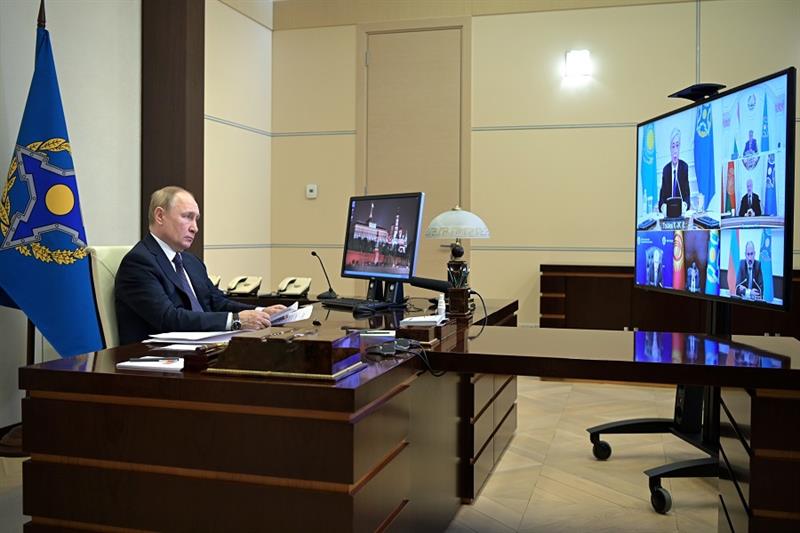
Russian President Vladimir Putin takes part in an extraordinary session of the Collective Security Council of the Collective Security Treaty Organization via videoconference at the Novo-Ogaryovo residence outside Moscow, Russia, Monday, Jan. 10, 2022. AP
During a video-conference of leaders from several ex-Soviet countries in a military alliance that sent in the troops, his Russian counterpart Vladimir Putin confirmed they would leave as soon as their mission ended.
The Central Asian country has been left reeling in the wake of the worst violence in its recent history, but life in Kazakhstan's largest city Almaty appeared to be returning to normal Monday, with internet coverage restored as the nation observed a day of mourning for dozens killed in the clashes.
Tokayev told the video-conference that "armed militants" had used the backdrop of protests to try to seize power.
"The main goal was obvious: the undermining of the constitutional order, the destruction of government institutions and the seizure of power. It was an attempted coup d'etat," Tokayev said.
The Moscow-led Collective Security Treaty Organisation (CSTO) has deployed just over 2,000 troops and 250 pieces of military hardware, the Kazakh leader said, vowing that the detachment would leave the country "soon".
- Temporary deployment -
Some have voiced concerns that Moscow could leverage the mission to shore up its influence in ex-Soviet Kazakhstan, with US Secretary of State Antony Blinken warning last week that "once Russians are in your house, it's sometimes very difficult to get them to leave".
"A contingent of CSTO peacekeeping forces has been sent to Kazakhstan -- and I want to emphasise this -- for a limited time period," Putin said during the meeting.
He said Kazakhstan was facing a threat from "international terrorism" and that measures taken by the CSTO showed that its members would not allow "so-called colour revolutions" to break out in the region.
Authoritarian Kazakhstan has accused "armed bandits" and terrorists of being behind the unrest, which began with protests over a fuel price hike.
The government said Monday that foreign media reports had created "the false impression that the Kazakhstan government has been targeting peaceful protesters".
"Our security forces have been engaging with violent mobs who were committing brazen acts of terror," the foreign ministry said in the statement.
Tokayev said in the meeting that his country's security personnel "have never fired and will never fire on peaceful demonstrators".
- Internet restored -
Almaty, the country's main city and former capital, had been nearly completely offline since Wednesday, but local and foreign websites were accessible again Monday morning.
AFP correspondents saw public transport operating there for the first time since the violence, which left government buildings burned and gutted and many businesses looted.
Lyudmila, a pensioner waiting for a bus in central Almaty's, said she learned the internet was back when she received a call online from relatives in Ukraine.
"I had no idea that we were back online again," she said, giving only her first name.
She told AFP that during clashes on Wednesday night, injured soldiers had been dragged into the courtyard of the apartment building where she lived for emergency treatment.
Kazakhstan's government has struggled to firm up its narrative of the unrest.
On Sunday, the information ministry retracted a statement that said more than 164 people had died in the unrest, blaming the publication on a "technical mistake".
Officials previously said 26 "armed criminals" had been killed and that 16 security officers had died.
In total, nearly 8,000 people have been detained for questioning, the interior ministry said Monday.
Nur-Sultan, the city that replaced Almaty as capital in 1997 and which was renamed in honour of 81-year-old founding president Nursultan Nazarbayev in 2019, saw comparatively little unrest.
- Elites roiled -
The contours of the political crisis that engulfed Kazakhstan are unclear but the ruling elite has been roiled.
On Saturday, authorities announced the arrest on treason charges of Karim Masimov, a high-profile Nazarbayev ally who was dismissed from his post as security committee chief at the height of the unrest.
Nazarbayev, who was widely regarded as holding the strings in the oil-rich Central Asian country despite stepping down from the presidency in 2019, has not spoken in public since the crisis began.
Nazarbayev's press secretary said Saturday that Nazarbayev was in "direct contact" with Tokayev and called on Kazakhs to "rally around" the president.
Nazarbayev hand-picked Tokayev as his successor when he stepped down after more than a quarter-century as head of state. Tokayev's spokesman said Sunday that he was "taking decisions independently".
Short link: